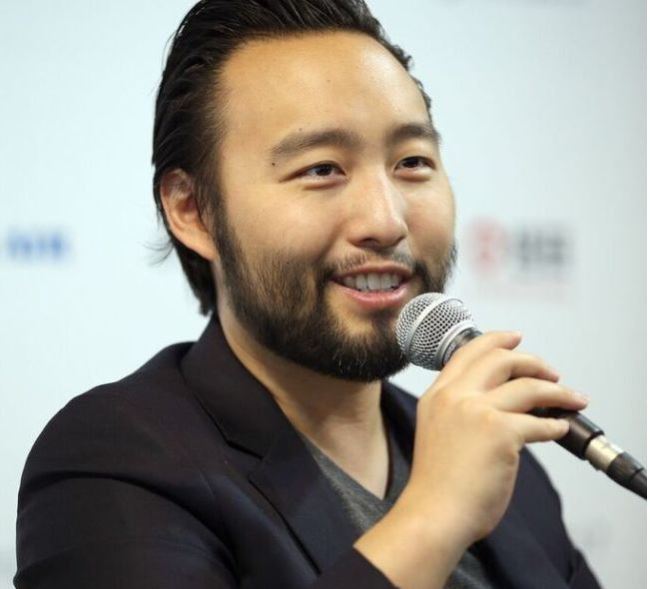[Herald Interview] Virtual reality is the next great art form: Eugene Chung
Korean-American founder of Penrose, studio at vanguard of VR animation, talks roaming new territory in filmmaking
By Rumy DooPublished : Oct. 17, 2017 - 12:39
BUSAN -- Virtual reality has been grabbing attention as the “next big thing” in film. Busan International Film Festival is operating a VR theater this year; Venice’s Biennale became the first major film festival to incorporate an award category for VR films.
Eugene Chung, VR filmmaker and CEO of Penrose Studios, believes the new medium will impact the film industry in profound ways.
“My entire life I was very interested in the idea of how art forms change over time. But I never thought I’d live to see that transformation,” he said in an interview at the Busan Cinema Center Monday.
His company produced VR animated films “The Rose and I,” “Allumette” and “Arden’s Wake,” which won best VR film at the Venice International Film Festival in September.
The 15-minute piece “Arden’s Wake,” screening at BIFF’s VR theater this year, has been lauded as a game changer in VR cinema for both its moving story and technological innovation. Its protagonist Meena is a young girl who lives with her father in a lighthouse on the clouds, floating above a shadowy sea. After her father goes missing, Meena dives into the postapocalyptic ocean city, embarking on a journey to self-discovery.
Eugene Chung, VR filmmaker and CEO of Penrose Studios, believes the new medium will impact the film industry in profound ways.
“My entire life I was very interested in the idea of how art forms change over time. But I never thought I’d live to see that transformation,” he said in an interview at the Busan Cinema Center Monday.
His company produced VR animated films “The Rose and I,” “Allumette” and “Arden’s Wake,” which won best VR film at the Venice International Film Festival in September.
The 15-minute piece “Arden’s Wake,” screening at BIFF’s VR theater this year, has been lauded as a game changer in VR cinema for both its moving story and technological innovation. Its protagonist Meena is a young girl who lives with her father in a lighthouse on the clouds, floating above a shadowy sea. After her father goes missing, Meena dives into the postapocalyptic ocean city, embarking on a journey to self-discovery.

Chung likens the dawn of VR to the introduction of the moving picture film. Born to an accountant mother and opera singer father, both Koreans, Chung said he realized early on the “disruptive innovation” a new art form could bring to human storytelling.
“Growing up, my father would fly around the world singing Carmen but kids in my neighborhood would watch TV and play video games, not watch opera,” he said. “The opera was considered the pinnacle of all art a long time ago -- it had the best stories, stage, music and talent.” The advent of the film camera in the 1890s shook the entire industry and gave birth to a new one, he explained.
“We can’t name a major opera production company, but everyone can name a major movie company, like Paramount. We remember it because it was on the vanguard of a new art form.”
Korean-American Chung says he realized that VR -- which allows viewers the immersive experience of being inside a scene, rather than watching it from afar -- was an entirely new way of evoking emotions. “I don’t think it’s really understood how much (VR) will shift the way we perceive visual and audio art going forward.”
“Arden’s Wake” is the brainchild of Penrose Studios, which has been likened to the Pixar or DreamWorks of the burgeoning VR film scene. Many of the engineers and creators at the company, founded in 2015 by Chung, are veterans from Pixar. Chung himself previously helmed the story studio at Oculus, where his team first began developing stories for the VR platform. Prior to that, he worked at Pixar as an animation producer.
An interdisciplinary approach is inevitable in the budding stage of an industry, says the New York University Tisch School of the Arts and Harvard Business School graduate. Content creation and hardware engineering is happening simultaneously: “It’s like painting the picture and designing the paintbrush at the same time.”
Creating stories for the VR platform -- how to allow viewers freedom to roam the lush virtual space while leading them through a story -- is new territory. “In that way, it’s like opera, where you have to guide viewers’ attention through sound, movement and lighting.
“It took (2-D) filmmakers a long time to discover cinematic language and create tropes.” VR storytelling is in that process, he says.
As Penrose creators were developing their projects, they realized that the traditional form of flat storyboards were insufficient, and often hindrances, to creating a VR story. “We just could not see how it would look from a 360-degree point of view.”
That prompted the studio’s engineers to build an entirely new program for VR designers to create their drawings within the VR space. It went on to make Maestro, a software which allows employees from different cities to meet in a VR space to develop a film together. The tool could have major implications for incorporating VR into social media, Chung says.
The key issue, as with any new industry, is commercialization. But the VR market is progressing at an even faster speed that Penrose’s projections, he noted. “If you look at the adoption of things in the past 100 years such as radio, television, console games, the numbers look fine for VR. Hardware development is key, and it’s going to be driven by content.”
By Rumy Doo (doo@heraldcorp.com)









![[Today’s K-pop] BTS pop-up event to come to Seoul](http://res.heraldm.com/phpwas/restmb_idxmake.php?idx=644&simg=/content/image/2024/04/17/20240417050734_0.jpg&u=)
![[Graphic News] More Koreans say they plan long-distance trips this year](http://res.heraldm.com/phpwas/restmb_idxmake.php?idx=644&simg=/content/image/2024/04/17/20240417050828_0.gif&u=)






![[KH Explains] Hyundai's full hybrid edge to pay off amid slow transition to pure EVs](http://res.heraldm.com/phpwas/restmb_idxmake.php?idx=652&simg=/content/image/2024/04/18/20240418050645_0.jpg&u=20240419100350)

